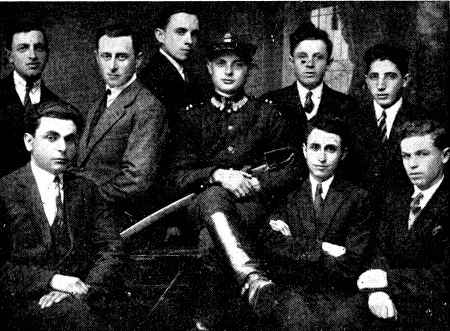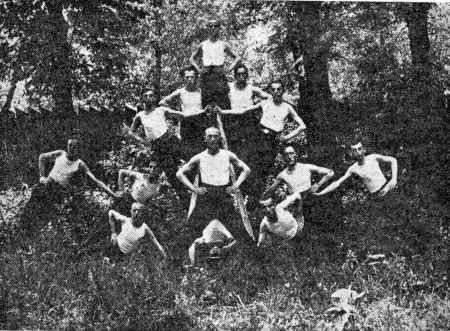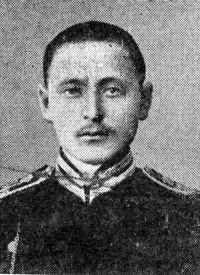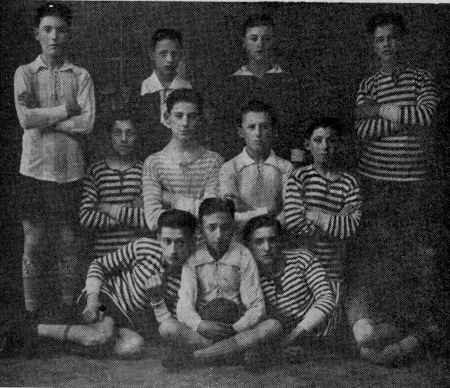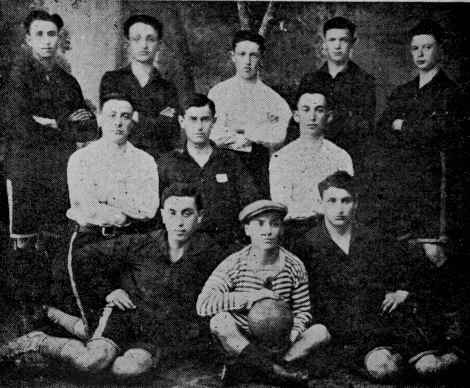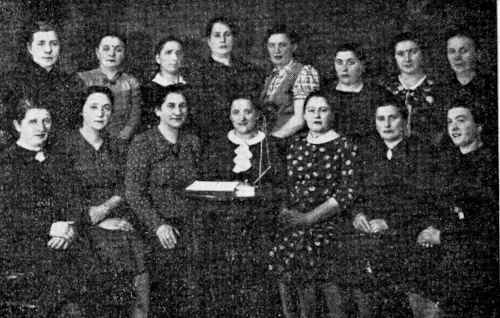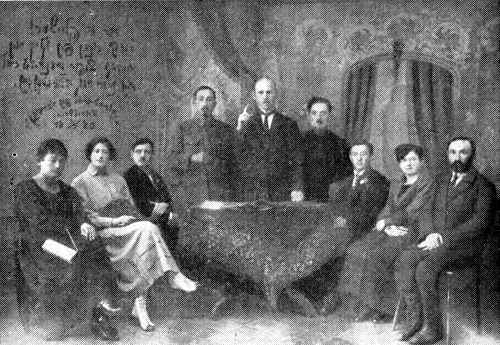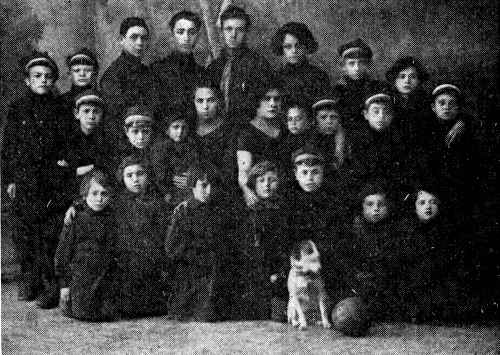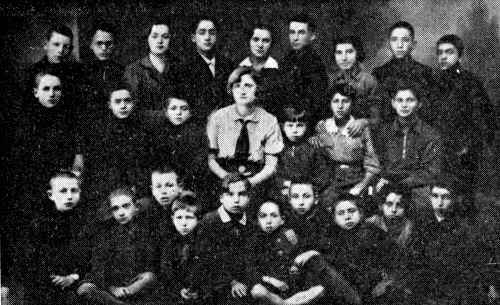[Columns 307-308]
Hrubieszow Youths
in the Military and in Sports
Translated by Yael Chaver
|
|
|
|
Yisro'el Dimenshteyn attains the rank of Corporal in the Polish army,
and his friends commemorate the event
Standing: Ruven Ekshteyn, Yo'el Shpiler, Yisro'el Dimenshteyn, Yoyne Zayd, Oyzer Shpritz, and Dovid Harfin
Seated: Motl Shpiler, Avigdor Biterman, Arish Rap |
|
Hrubieszow youth train during the Austrian occupation, 1917
Top row, center: Hubel
Around him: Moyshe Herman, Barnet, Sender Fayl, Simkhe Hipsh
Second row: Ratnievski, Eli Finkelshteyn, Pinkhes Lerer, Shmuel Eli Ayzen, Zelik Perets
Standing: Barnet |
| |
|
|
| Yankl Sovetski in the Czarist army |
| |
|
|
|
|
The “Kraft” Football Club, 1927
Standing: Khayim Harfin, Yoysef Shroyt, Avrom Tsigel, Hersh Sas
Seated: Shimen Vertman, Avrom Foygl, Yoysef Krelnboym (Almogi), Yehoshua Berger
Bottom: Hersh Zak, Me'ir Plat, Yoysef Me'ir Lerer |
|
The “Spartacus” Sports Club
Top row, standing: Yisro'el Dimenshteyn, Shimshen Zharki, Yoysef Shtokhammer, Yo'el Shtayer, Avigdor Biterman
Second row: Yo'el Rabinovich, Yoysef Lederkremer, Yisro'el Pakhter
Seated: Avrom Hokhman, Zelik Luksenburg, Mekhl Gertl
|
[Columns 309-310]
The Jewish Hospital
by Yekhezkel Oder, Melbourne, Australia
Translated by Yael Chaver
Health conditions under the Czarist regime lagged far behind that of other areas of Europe. Provincial towns were left to themselves in a stormy sea of epidemics and diseases. As all Hrubieszow natives remember, falling ill was labeled a collapse; it often led to an untimely death.
There was no help to be had from the Health Department, which was supposedly in charge of the population's health; it was “powerless.” Advanced medical care was far away. Horse and cart were the means of communication, and that, too, only in fine summer weather.
We can readily imagine the widespread fear of epidemics in the Jewish and general population of Hrubieszow. Death reigned, especially among children.
As it happened, there were renowned physicians in Hrubieszow at the time, among them Dr. Pistal. Actually, Dr. Pistal was a member of the assimilated circles, yet he was dedicated to the medical service of the Jewish residents. As he was no stranger to the problems of the Jewish population, and was familiar with the great need that he himself sought to aid, it was he who had the idea of building a Jewish hospital that would serve the Jewish population exclusively.[1] The treatment of sick Jews in other hospitals is well known.
Furthermore, Dr. Pistal had to do this on his own responsibility and with his own financial means, as the Jewish community had no funds at that time. He carried out his mission successfully.
For as long as I can remember, the house – later taken over by the orphanage – was the residence of Pistalowa, an old solitary woman, who did not mix, and made a living by giving lessons. This was the widow of our beloved Dr. Pistal, whose memory was cherished by the Jews of Hrubieszow as well as by the general population.
The first board of the Jewish hospital included Shoul Ayzen, Shloyme Regl, and Avrom Brand. They were also the community's managers.
Financial Difficulties
The hospital budget was covered partly by the town and partly by the community's funds, as circumstances allowed. Those who were ill were not charged any fee.
During World War I, the hospital served the passing armies, especially when battles were raging at the strategic point at the Bug River, 5-6 kilometers from Hrubieszow.
The Jewish hospital overflowed with sick Jews, and its tasks had to be financed by the community. The community's leadership found it necessary to enlarge the circle of supporters, and set up a special committee to create funding for this purpose. However, financial difficulties developed, due to a very simple reason: the funders – the rich men of the community, who were the main donors – lost their fortunes overnight because of the inflation during the Austrian occupation. Thus, instead of donors a large number of needy people appeared, and the community had to support them.
The first committee was formed in 1916, consisting of these members: Manikow, S. Blanes, Leyb Kenap, and Mendl Korn. It started collecting funds for the hospital by fundraisers, projects, theater performances, meetings, parties, and the like.
The committee also convinced many renowned doctors, Jews and Christians, the so-called “honorary doctors,” to help shoulder the burden of the medical institution. At that time, the hospital had already been modernized with various facilities, including an operating room. The Jewish hospital was on Lubelska Street. As is well known, people avoided it because of the building in the garden where purification of the deceased was performed.[2]
The sick persons who crept around were entertained by a special attraction. The pump was just across the way. Everyone remembers that it was always surrounded by water-carriers. A carrier named Fandl and the “yellow” water carrier supplied the best comedic moments. When these two met, there were scenes with strange phrases and curses – wonderful material for numerous comedies, and the sick persons enjoyed these amusing scenes.
Honorable Doctors
Let us not forget our doctors, who dedicated their time to the sick. I believe that many remember Dr. Rapoport, who was beloved by the residents of Hrubieszow. Another popular doctor who gave his time without compensation was Dr. Szenecki, a Polish physician who was very dedicated to his work and remonstrated with city officials who neglected their duties. He visited the hospital daily. In 1920-1921, Dr. Grynszpan stayed in Hrubieszow after being stationed there during his service in the Polish army, and settled there. He worked for the hospital until World War II.
[Columns 311-312]
|
|
A group of women philanthropists who helped the sick and the needy
Standing: third–Tsine Oyl, Sheyndl Hipsh, Perl Finkelshteyn, Vaynberg, Beyltshe Finger, unknown
Seated: Khane Zilberblekh, unknown, Khane Lerer, Sore Zayd, Feyge Sher, Biterman-Falik, and Gitl Zuberman |
During the last years before the Holocaust, when persecution of the Jewish residents intensified, and following a string of incidents with Polish ruffians who molested him, Dr. Grynszpan decided to leave, and went to Brazil several weeks before the war broke out.
In the last year, two younger doctors devoted themselves to the hospital: Dr. Lifshits, a native of Chelm, and the Hrubieszow native, Dr. Moyshe Perets (son of Yantshe Perets). They practiced medicine in Hrubieszow, and visited the hospital daily as “honorable doctors.”
Physician's Assistants
We are certainly aware that a hospital needs nurses and physicians' assistants. This thought leads us to our uncle, Falik Gertl. I don't remember precisely when Uncle Falik took on this position, but I remember being taken, as a young child, to visit Uncle Falik; he and his family lived in the hospital greenhouse. For young children, it was a walk in a mysterious labyrinth!
Uncle Falik was a Hasid, a good-natured, smiling physician's assistant, who was as popular and as trusted as the doctors. At the first signs of illness, Falik was summoned, and in many cases the worry was unnecessary: kind Falik would take away the illness as if by magic.
The official physician's assistant was Kraytser, who leaned toward assimilated circles. He was devoted to the hospital and was very popular in town, among Jews and non-Jews alike. In the last years before the Holocaust, he established a pharmacy, but still worked at the hospital. His assistant was Uncle Falik Gertl, who was followed by the very capable Hirsh-Meir from Grabowiec (who was murdered in Soviet Russia). He worked at the hospital, and served the ill Jews in town.
Dr. Pistal's vision, however, was incapable of foreseeing a destruction of such terrible scope; a town full of Jews who would have remembered and praised him and his institution for generations to come.
I received the information about the Jewish hospital from Mendl Korn (Australia).
A Community Meeting Concerning the Hospital
A meeting of the Jewish community was planned for Saturday evening, November 15, at the community's building. The Jewish doctors were to discuss the issue of the Jewish hospital. When the mayor found out about the meeting, he telephoned and asked to be notified of the time, as he wanted to be present. In honor of this request, the community's chairman invited the entire board in addition to the leadership. They all gathered Saturday evening and waited for the important guest to arrive.
Some time passed, and the mayor did not arrive. The assembled people were becoming a bit impatient, but they waited. The mayor's press secretary, Gurni, came and announced as the mayor's representative that those gathered were requested to wait a bit longer, as he would soon come.
The mayor came half an hour later. Everyone rose to their feet. The guest took his place, and the meeting began. After the hospital issue was resolved, the guest addressed the assembly and asked them all, as representatives of the Jewish residents of Hrubieszow, to influence the Jewish voters to vote for “List No. 1.” The leaders responded that there was no need to use influence, as everyone would vote for him anyway because of the letter from the rabbis and hassidic leaders, but that they would help him nonetheless. The mayor thanked them in advance, and was very pleased. As he left, he parted on very friendly terms, and the vote was very high.
Hrubieszower Lebn, No. 49, November 1930.
Translator's Footnotes:
- Original Note: As we know, the Hrubieszow hospital was founded in the second half of the 19th century by Rabbi Yoysef Katsenelenboygen and Rabbi Yoysef Gelerter (HaMaggid, No. 7, 1865). Clearly, Dr. Pistal renovated the hospital. Return
- Ritual washing and cleansing of the deceased is performed in preparation for burial, and special prayers are said. Return
[Columns 313-314]
The Orphanage
by Yekhiel Fayer
Translated by Yael Chaver
|
|
The committee of the Hrubieszow orphanage in 1930
Right to left: Moyshe Dovid Mernshteyn, Reyzl Perets, Safir the teacher, Dovid Tenenboym, Dovid Flaysher, Aks the teacher |
In the middle of Lubelska Street, there was a small, shabby, miserable-looking house, badly in need of help. This was the building that served as the home for orphans of World War I, and “natural” orphans as well.
The orphanage was managed by kind, philanthropic women, who donated some of their time. However, their work was not grounded in the community.
In 1923-4 we, the young people of Hrubieszow, felt it our duty to devote ourselves enthusiastically to helping the orphanage. We considered the orphans to be citizens of a future, lively Jewish generation, and we began working.
We remodeled the old, damaged building, organized the kitchen under the leadership of Khane Vayner (who now lives in Haifa, Israel), set up a kitchen directorship, and provided the orphans with new clothes.
Our operation “Orphanage Renovation” was successful. We sent the children to the Tel-Chai school, and arranged preparatory classes for the children who were lagging behind. The children felt that the orphanage was becoming their home. This encouraged us to continue working with all our might.
We set up ongoing supervision of everyday matters, such as cleanliness and behavior. We encouraged the children's initiatives: excursions, sports, football, etc. A Froebel-trained kindergarten teacher was introduced, who got along very well with the children.[1]
In this way, we created a broad community basis [of support]. There were several drives to fund the orphanage, and we received an annual subsidy from the town council.
To a certain degree, we derived pleasure from our work. Some of the orphans joined HeHalutz and now live here in Israel with us.[2] Unfortunately, a large proportion of the young people did not succeed in emigrating to Palestine, and the murderous hands of Hitler (may his name be blotted out) killed them along with other Jewish martyrs.
Let the saved orphans be our consolation for our devoted work in the Hrubieszow orphanage.
Translator's Footnotes:
- The 19th-century German educator Friedrich Froebel is credited as the father of the kindergarten idea. Return
- HeHalutz was a Zionist youth movement. Return
The Orphanage
by Arn Glezer, Holon, Israel
Translated by Yael Chaver
My dear fellow natives, I have a grievance towards you. I've participated in six memorial events in Tel Aviv devoted to those who were murdered, but no one has ever mentioned the murdered children of the Hrubieszow orphanage. As I am one of those who were happily saved, I would like to recount something at least, as best I can.
The orphanage children gave presentations on each and every national holiday; these presentations always brought joy to the audience. Once, they gave a performance in the town of Dubienka, under the direction of Y. D. Mitelpunkt, with the music director Mekhl Gertl. The small Firemen's Hall was full, and the audience greatly enjoyed itself. However, just then a large fire broke out, as well as a torrential rainstorm. We children could not travel back to our vacation camp “Strushele,” and the residents of Dubienka took us into their homes for the night. Now, I'd like to present some facts.
The building was at 25 Lubelska St. close to the Jewish Hospital, near the road. Several dozen orphaned boys and girls lived there. A committee managed the institution. I remember only a few of the members' names: Zilbershteyn, Finkelshteyn, Royter, Naymark.
Our education was national and Zionist. We studied at the Tel Chai school, which was government-supported. We played mostly at the Błonie and went swimming in the Prowalies.[1] Mendele Vayner taught us swimming by tying a rope to our feet. We ate the pears from Pinye Mer's tree; we would throw stones at it cleverly.
The children all felt like siblings, children of the same parents. The mother was Khane Vayner, who now lives in Haifa.
After finishing our schooling, we were sent to Piotrk–w to learn a trade. We were all in a state of suspense before the move to Piotrk–w. I remember a few names of those who moved out: Abish Mints, Mendl Meyterman, Fishl Zilbershmidt, Ayzik Gurfinkel, and Perele Rayz.
[Columns 315-316]
|
|
The Orphanage Children
Top row: Ayzik Finkelblekh, Perl Ayz (Hokhman), Yisro'el Eng, Gutsha Vayner (Hershkovitsh), Yankev Vayner, Yekhi'el Fayer, Shmerl Mints, Fishl Dikhterman, Mendl Meyterman
Middle row: Abish Mints, Dovid Goldman, Yosele Shtern, Rokhl Efron, Khone Vayner, Tsharne Shtern, Mendl Vayner, Khayim Trager
Bottom row: Rokhele Vasing, Leya Baden, Tevye Vayner, Brokhe Hey, Keyle Rozenberg, Perele Burshteyn, Motl Klerer |
|
|
The children of the Hrubieszow orphanage
Top row: Yo'el Blank, Shloyme Liber, Pnina Bornshteyn, Elyakim Rubinshteyn, Dvoyre Fagel, Leyb Shteynvurtsl, Golde Knal, Feyge Shluker,– Nisan
Middle row: Mendl Kirshner, Tsharne Shtern, Malke Hochman, Teacher Shaynerman, Khonon Druker, Vove Rot, Meir Lerer
Bottom row: Yoysef Dak, Khane Finger, Hershl Kriger, Ben-Tsiyen Vaysman, Yoysef Kriker, Khane Hochman, Reyzele–, Berl Pines, –Moyshele, Motl, Kopl |
Let us recall an embarrassing episode, which is not rare among children. One of the Piotrk–w group came on vacation, and was put in bed beside me. What happened to him often happens to small children[2]. He was very ashamed, and decided that, as I was younger than he, should take the blame upon myself. He didn't expect me to do this for free, and immediately gave me a ten groschen coin. That was the first money I earned, by taking his disgrace upon myself.
We were rascals and pranksters. There lies a sleepyhead snoring, too sleepy to even go to the cinema. We set up a broom topped with a cup of water at his head. The moment he woke up, he got a cold bath on his scalp
We had our own jazz ensemble: one played the chopping knife, another the washboard, a third – with a pair of scissors, and others played pot lids, rolling pins, kettles, silverware, etc.
We enjoyed going to the bath-house, and (excuse the comparison) to the cinema, to see Maniekov or Rusalka.[3]
Going to Rabbi Verthaym's was quite an experience. I would bring him our beautifully dark, well-baked bread, and receive a white bread for Shabbat. I would carry the rabbi's bread with special pride. While on the topic of the rabbi, let me mention his daughter, whose white gloves were borrowed for me. On Poland's national holiday, we schoolchildren were supposed to march in the street parade. I was slated to march at the head and salute, wearing white gloves. And Rabbi Verthaym's little daughter had white gloves. Can you understand my pride on that occasion?
Some time before Passover, we were all taken to the tailor and shoemaker, and measured for new clothes and shoes.
And do you remember the twins Yosele and Chernele Shtern? Do you remember the terrible Friday evening when the girls became faint because of the hot ovens? There was a great uproar, just as the audience was leaving the cinemas on Panska St. Everyone started running to the orphanage, screaming loudly. We boys in the other rooms became so frightened that we leaped out of our beds, naked as we were, into the streets, wailing for help.
I should mention that the children had to endure various surprises on the part of the committees. There were crises, and often, new elections. Each new committee had its own whims, and always at our expense. For instance, a new committee decided that we should stop attending the Tel Chai school and start attending the government's regular school. We lost an entire school year as a result. Then a different committee came along, and we lost a year – again.
After Khane Vayner emigrated to Palestine, Rokhl Shaynerman arrived, a redheaded educator from Uscilog. Our relations with her were not too good. Once, when I complained about her to the chairman, she didn't allow me to go home to my mother in Ludmir during vacation. However, I wanted to go and visit my mother. How could I do this? Besides, I had no money for a ticket. It so happened that a woman I knew had ordered shoes from a shoemaker in Ludmir. She gave me the money to pay for the shoes, and I now had money for the bus ticket. I secretly prepared a package of clothes, which I gave to a friend to carry. I walked to the bus stop empty-handed, so that no one would notice. I quickly entered the bus, and my friend threw me the package.
I was happy, and delighted to see my mother. But when I had to return, my mother had to accompany me. In any case, it was pointless. The redheaded educator refused to allow me back into the orphanage.
But I'd like to forget all that. I'd rather remember the sweet early morning walks when we were on vacation, the games in the forest and the fields, the Lag B'Omer celebrations, going to Zamość – all the childish joys of orphans – almost all of whom were killed.
Let us remember them with love and honor!
Translator's Footnotes:
- The Błonie was a small island in the Huczwa River. I was not able to identify these other place names. Return
- Editor's note: This is apparently a reference to bed-wetting. Return
- I was not able to identify Maniekov; Rusalka may have been one of several early 20th century films that were based on the Slavic legend of a water sprite by that name. Return
This material is made available by JewishGen, Inc.
and the Yizkor Book Project for the purpose of
fulfilling our
mission of disseminating information about the Holocaust and
destroyed Jewish communities.
This material may not be copied,
sold or bartered without JewishGen, Inc.'s permission. Rights may be
reserved by the copyright holder.
JewishGen, Inc. makes no representations regarding the accuracy of
the translation. The reader may wish to refer to the original material
for verification.
JewishGen is not responsible for inaccuracies or omissions in the original work and cannot rewrite or edit the text to correct inaccuracies and/or omissions.
Our mission is to produce a translation of the original work and we cannot verify the accuracy of statements or alter facts cited.
 Hrubieszów, Poland
Hrubieszów, Poland
 Yizkor Book Project
Yizkor Book Project
 JewishGen Home Page
JewishGen Home Page
Yizkor Book Director, Lance Ackerfeld
This web page created by Jason Hallgarten
Copyright © 1999-2026 by JewishGen, Inc.
Updated 25 Sep 2022 by LA
